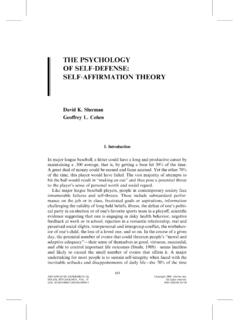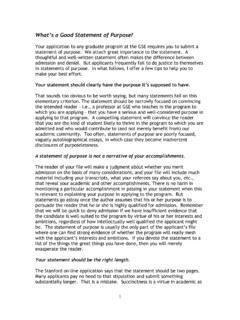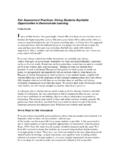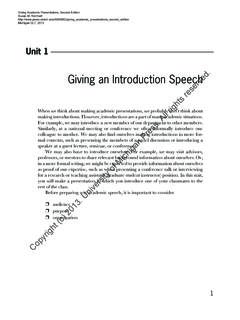Transcription of Academic Tenacity - Stanford Graduate School of Education
1 Academic Te n a c i t yMindsets and Skills that Promote Long-Term Learning Carol S. Dweck | Gregory M. Walton | Geoffrey L. Cohen Academic Tenacity | 1 Table of ContentsIntroduction 2 Defining Academic Tenacity 4 Measuring Tenacity and Its Effects on Achievement 5 Mindsets and Goals 5 Social Belonging 11 Self-Regulation and Self-Control 12 Interventions that Improve Academic Achievement by Developing Tenacity 14 Mindset Interventions 15 Social Belonging and Value Affirmation Interventions 17 Identity and Self-Relevance Interventions 19 Teaching Self-Regulation 21 Integrating Curricula with Practices that Promote Academic Tenacity 21 How Good Teachers and Schools Foster Academic Tenacity 22 Challenge 22
2 Scaffolding 26 Belonging 30 Endnotes 33 The authors would like to acknowledge David Paunesku and David Yeager for their valuable assistance with this report and KSA-Plus Communications for its editorial and design Tenacity | 2 IntroductionIn a nationwide survey of high School dropouts, 69 percent said that School had not motivated or inspired them to work In fact, many of the students who remain in School are not motivated or inspired either, and the more time students spend in K 12 Education the worse it This lack of motivation to do well in School represents a serious loss of human potential, with implications for students well-being later in life and for our country s future economic growth.
3 What prevents students from working hard in School ? Is it something about them or is it something about School ? More important, is there a solution to this problem?Most educational reforms focus on curriculum and pedagogy what material is taught and how it is taught. However, curriculum and pedagogy have often been narrowly defined as the Academic content and students intellectual processing of that material. Research shows that this is insufficient. In our pursuit of educational reform, something essential has been missing: the psychology of the student. Psychological factors often called motivational or non-cognitive factors can matter even more than cognitive factors for students Academic performance.
4 These may include students beliefs about themselves, their feelings about School , or their habits of self-control. Educators, psychologists, and even economists recognize the importance of non-cognitive factors in achievement both in School and in the labor These factors also offer promising levers for raising the achievement of underprivileged children and, ultimately, closing achievement gaps based on race and The research reviewed in this paper shows that educational interventions and initiatives that target these psychological factors can transform students experience and achievement in School .
5 Improving core Academic outcomes such as GPA and test scores months and even years later. When we refer to the psychology of the student, what do we mean? We mean that students need to think of themselves and School in certain ways in order to want to learn and in order to learn successfully. We also mean that they are able to regulate themselves in ways that promote these non-cognitive factors are in place, students will look and be motivated. In fact, these non-cognitive factors constitute what psychological researchers call motivation, and fostering these mindsets and self-regulation strategies is what psychological researchers typically mean by motivating students .
6 This is quite different than adults trying to motivate students through money and other rewards. Rather, we emphasize the type of motivation that students carry with them in the form of mindsets and skills, and the kind that educators promote by fostering these mindsets and attempts to motivate students by promoting positive beliefs have included the self-esteem movement of the 1990s, which tried to motivate students by making them feel good about themselves, their abilities, and their prospects of success in School . Unfortunately, the self-esteem movement had the erroneous view that telling students they were smart or talented would raise their self-esteem and motivate them to do well in In fact, research has now shown that well-intended practices, such as praising students intelligence or talent (as opposed to their efforts or strategies), often backfire (a topic discussed later).
7 This is why research is so important and why an evidence-based approach to Education is so critical. We need to know which mindsets and non-cognitive skills matter and how best to impart them in educational factors often called motivational or non-cognitive factors can matter even more than cognitive factors for students Academic performance. These may include students beliefs about themselves, their feelings about School , or their habits of Tenacity | 3 Can focusing on students psychology be effective even when students come from poor backgrounds; live in communities with many problems and few resources; and go to underfunded, understaffed, and underachieving schools?
8 Shouldn t we put all of our resources into enriching homes, communities, and schools? It is undoubtedly important to provide students with material and human resources, such as a safe learning environment, committed and effective teachers, and a solid curriculum. However, addressing the psychology of the student is also critical and can galvanize students to seize the opportunities for learning that exist in their School adversity that children experience both in and out of School can affect their psychology, with consequences for learning. So while we continue to tackle large-scale problems in our educational system, we can directly help students to become more motivated and successful learners.
9 Moreover, with greater awareness of non-cognitive factors, educators may be able to do relatively small things in the classroom that can make a big difference in their students Tenacity | 4 Defining Academic Tenacity The non-cognitive factors that promote long-term learning and achievement can be brought together under the label Academic Tenacity . At its most basic level, Academic Tenacity is about working hard, and working smart, for a long time. More specifically, Academic Tenacity is about the mindsets and skills that allow students to: look beyond short-term concerns to longer-term or higher-order goals, and withstand challenges and setbacks to persevere toward these concerns might involve worries about looking dumb or being excluded in School .
10 They might involve an unwillingness or inability to put off immediate gratification in favor of longer-term achievements. Any of these factors may make students less engaged with School , less likely to take advantage of opportunities to learn, and less equipped to meet challenges or does Academic Tenacity look like? Academically tenacious students exhibit the following characteristics and behaviors: They believe that they belong in School academically and socially. School is part of who they are and is seen as a route to future goals, such as providing for their families or contributing to their community or society.










